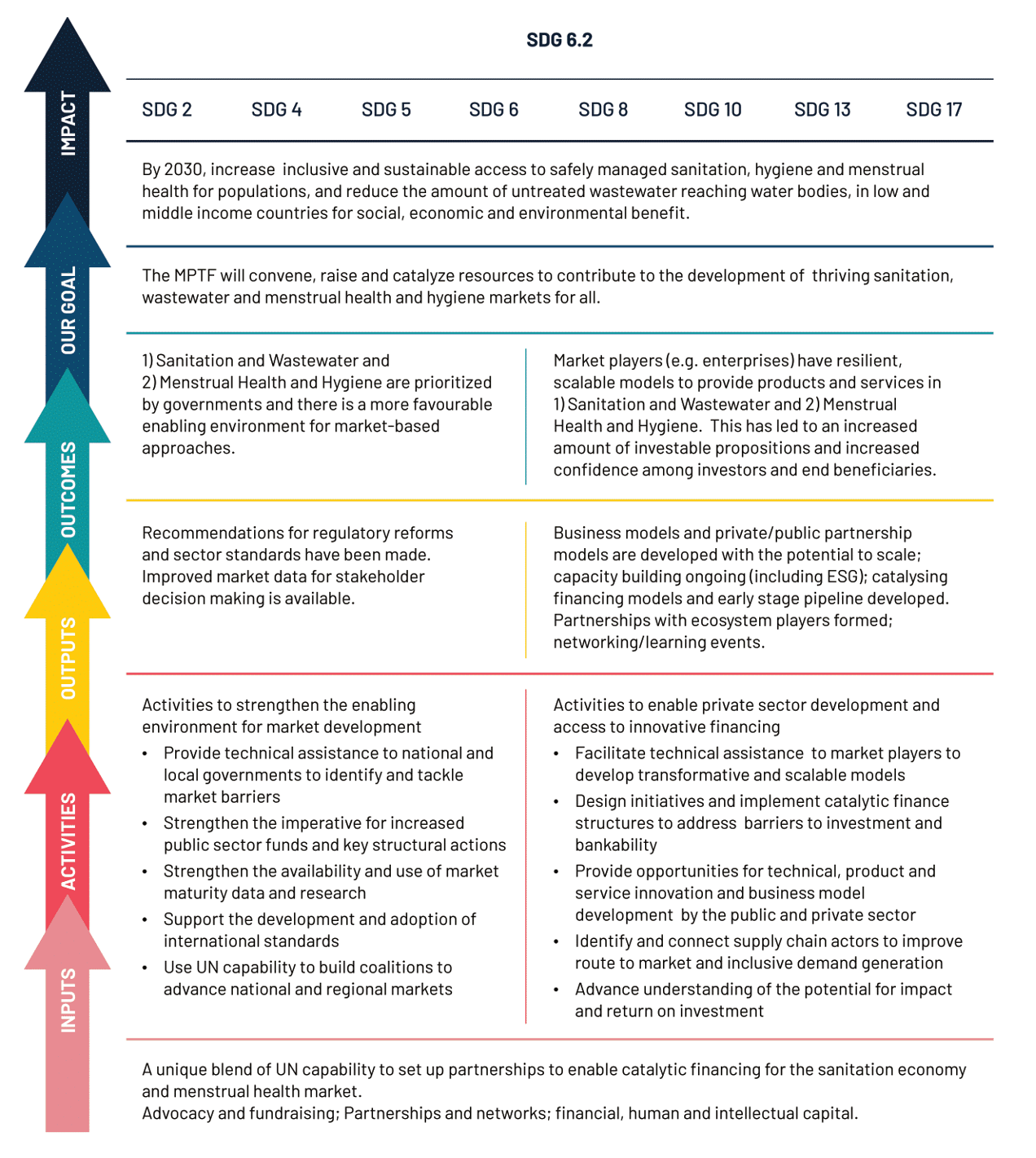Objectives
The UN Multi-Partner Trust Fund for Catalytic Finance in Sanitation, Hygiene and Wastewater
The first UN Multi-Partner Trust Fund (MPTF) dedicated to Sustainable Development Goal (SDG) target 6.2, the Sanitation, Hygiene and Wastewater MPTF brings a much-needed impetus to catalyze investments into the severely overlooked and underfunded sectors of sanitation, hygiene, menstrual health and wastewater.
Launched by the Sanitation and Hygiene Fund (SHF), together with the UN Capital Development Fund (UNCDF), the UN Environment Programme (UNEP) and UNOPS, the MPTF’s catalytic approach uniquely responds to local and regional contexts, national investment cases, financing strategies, climate risks, and the regulatory enabling environment to build sanitation economies and the menstrual health market.
Focusing squarely on market-based approaches to deliver impact on economies, people and the planet, the MPTF brings together the public and the private to create an enabling environment where investment in sanitation, wastewater management, hygiene and menstrual health is not only incentivized but thrives.
With its unique blend of UN capability and a dedicated mechanism for catalytic financing for the sanitation economy and menstrual health market, the MPTF aims to unlock social impact in health, education, gender equity and women’s power as well as environmental and economic impact through more inclusive, resilient and sustainable sanitation, wastewater, hygiene and menstrual health markets that deliver increased access and financial returns to investors and countries.
Fund scope
The UN Multi-Partner Trust Fund for Catalytic Finance in Sanitation, Hygiene, and Wastewater aims to create an enabling environment where investments in sanitation, wastewater management, hygiene, and menstrual health and hygiene (MHH) are better incentivized and thrive. By engaging public and private sectors, MPTF stakeholders foster sustainable and interconnected services that benefit communities in need while creating economic opportunities, promoting inclusiveness, and building circular, self-sustaining sanitation economies and menstrual health markets.
The focus on accelerating financing and market-based solutions for SDG 6.2 provides a platform to drive catalytic finance for growing the sanitation economy, including wastewater treatment and resource recovery, as well as the menstrual health market. Partners leverage their capabilities to attract diverse implementing organizations and mobilize funds towards these goals.
The initiative integrates gender and climate-sensitive factors into decision-making. This includes promoting women’s leadership and employment, ensuring equitable access, and supporting activities that combat pollution, conserve biodiversity, and mitigate climate change. Circular economy solutions—such as upcycled sanitation products and biodegradable materials—are prioritized to reduce resource depletion and environmental impact.
Theory of change
The MPTF aims to achieve SDG 6.2 by 2030: Universal access to safely managed sanitation, hygiene, and MHH, while reducing untreated wastewater in low- and middle-income countries.
The strategy includes:
1. Strengthening market enablers
- Providing technical assistance to governments to address market barriers.
- Increasing public investment and improving data-driven decisions.
- Supporting international standards and regulatory reforms.
- Advancing innovation and national capacities through UN expertise.
2. Engaging private sector
- Assisting enterprises in developing scalable models.
- Implementing financing structures to enhance investment viability.
- Promoting innovative partnership and service models.
- Aligning business models with environmental, social, and governance (ESG) principles.
Outcomes and impact
Fund efforts will establish sanitation, wastewater, and MHH as national priorities that are supported by market-based solutions. Improved regulation, robust business models, and collaborative partnerships will catalyze investments and enhance ecosystem support. Over time, scalable and resilient solutions will emerge, boosting confidence amongst investors and stakeholders. Public-private partnerships will expand, fostering long-term sustainability aligned with ESG principles.
Ultimately, the work of Fund partners will contribute to achieving SDG 6.2 while supporting related SDGs: Zero Hunger (SDG 2), Quality Education (SDG 4), Gender Equality (SDG 5), Decent Work and Economic Growth (SDG 8), Reduced Inequalities (SDG 10), Climate Action (SDG 13), and Partnerships for the Goals (SDG 17).





